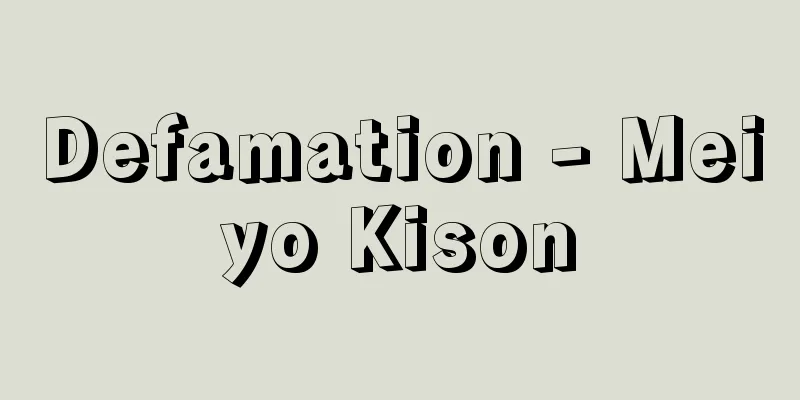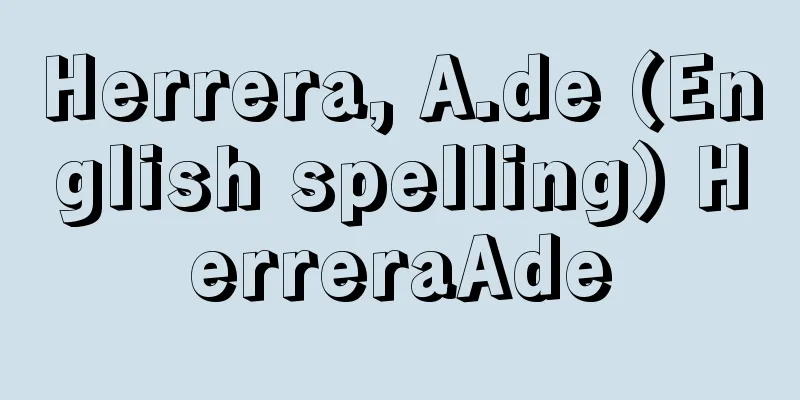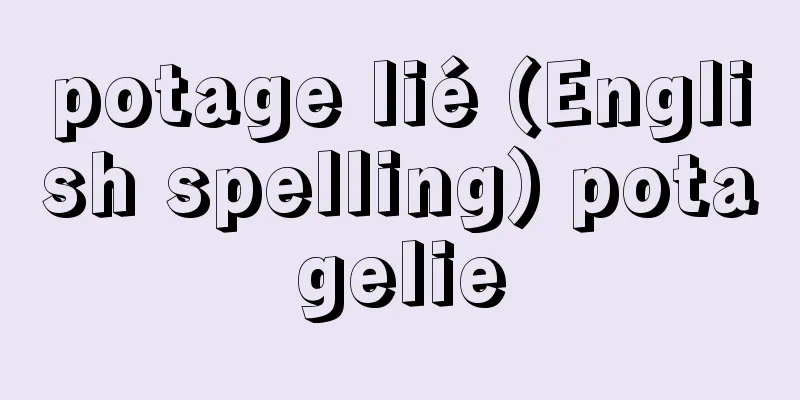Defamation - Meiyo Kison

|
It is an act that violates the reputation (honor) that an individual should have in the eyes of the general public for his or her character, virtue, reputation, and trustworthiness, in other words, an act that lowers one's social standing. [Takahisa Awaji] Defamation under civil lawIntentionally or negligently damaging someone's reputation constitutes a tort under the Civil Code (Articles 709 and 710). For example, if a newspaper or magazine publishes an article (such as a scandal) that defames a person, the existence of a tort by the publisher or between the publisher and the editor becomes an issue, but it is generally considered that there is no illegality if the report is of public interest and the truth is stated (such proof is called proof of truth). There are cases where the question arises as to whether defamation of the deceased should be recognized, but precedents have not recognized this, and have dealt with it as defamation of the surviving family or close relatives or an infringement of the feelings of respect and admiration. When defamation has been suffered, the victim may request appropriate measures to restore their reputation (for example, the publication of an apology advertisement in the newspaper) in addition to or in lieu of damages (Article 723). [Takahisa Awaji] Criminal defamationThe current Criminal Code, in the "Crimes Against Honor" section of Part 2, Chapter 34, provides for the crime of publicly disclosing facts and defaming a person (Article 230, paragraph 1) and the crime of insult (Article 231). Because social reputation is important in living in society, the Criminal Code protects honor as a social reputation as an individual's personal legal interest. However, since economic evaluation, such as willingness to pay and ability to pay, is separately covered by the crime of defamation (Article 233, first paragraph), this crime does not apply to cases where economic evaluation is damaged. Therefore, the "honor" in this crime includes social evaluation of a person, excluding the above-mentioned "credit," such as character, family status, and various abilities. As for the crime of insult, there is a dispute as to whether the protected legal interest is social reputation (external honor) or honorary feelings (self-esteem, pride), as in the case of this crime, and the prevailing view and precedents interpret it as external honor. The act of this crime requires the public allegation of facts, where "publicly" refers to a state in which the unspecified or many people can recognize it, and "alleging facts" refers to specifically stating facts in a way that lowers a person's social standing. Furthermore, the facts mentioned above do not matter whether they are true or not, and they can be facts that are publicly known. However, this is limited to defamation of the deceased, and is limited to cases where "slander" is made, that is, false facts are allegation (Article 230, Paragraph 2 of the Penal Code). For "defamation" to be a crime, it is not necessary to actually lower a person's reputation; it is sufficient to create the risk of it being so (a dangerous crime). By the way, in response to the "right of the people to know" that is the basis of freedom of expression and democracy in the current constitution, a new Article 230-2 on "proof of facts" was added by partial revision of the Criminal Code in 1947 (Showa 22). According to paragraph 1 of this article, even if it is a defamation crime under Article 230-1, (1) "if it concerns facts related to the public interest" (public nature of facts), (2) "if it is found that its purpose was exclusively to promote the public interest" (public interest of purpose), or (3) "if the truth of the facts is judged and their truth is proven" (proof of truthfulness). Furthermore, paragraph 2 of this article states that if the facts cited are "facts related to the criminal acts of a person against whom prosecution has not yet been instituted," then the public nature of facts is present, and paragraph 3 of this article states that "if it concerns facts related to a public official or a candidate for public office by public election," then both the public nature of facts and the public interest of purpose are present. [Tetsuro Nawa] Defamation and slander under private international lawAccording to Article 19 of the Act on General Rules for Application of Laws (Act No. 78 of 2006), which is Japan's private international law code, the establishment and effect of claims arising from tortious acts that damage the reputation or credit of others are governed by the law of the victim's habitual residence (or the law of the principal place of business in the case of a corporation, etc.). This rule is based on the assumption that the place in question is an important place where the reputation or credit of the victim exists, and on the grounds that when the places where the consequences arise are spread across multiple countries, it would be cumbersome to apply the laws of each country to the damages in each country. Although the governing law for torts involving defamation or defamation is set forth in this way, it is not definitively the governing law, and when there is another place that is clearly more closely related in light of circumstances such as the parties having habitual residence in a place with the same law at the time of the tort, or the tort being committed in violation of obligations based on a contract between the parties, the law of that other place is to be applied. This is an expression of the legislative intention to ensure the application of the law of the place with the closest relationship, but it has the disadvantage that the governing law for torts is not clearly known, and for example, the playing field for settlement negotiations is not defined. The parties to a tort may, after the tort has been committed, by agreement, change the governing law for the establishment and effect of the tort (General Rules for Application of Laws, Article 21, main text). However, if the change in governing law would harm the interests of a third party, the change cannot be asserted against that third party (Proviso, Article 21). Since tort claims are also property rights, the parties are allowed to dispose of them in substantive law, and so private international law also allows the governing law to be changed as long as it does not infringe on the rights of third parties. However, this change is also possible implicitly, and even if the governing law is originally the law of country A, if both parties assert in settlement negotiations or litigation that the law of country B is the premise, the governing law may be said to have been changed to the law of country B, which is likely to cause confusion as the party who will be disadvantaged by the change may claim that the change was made by mistake. In addition, if a lawyer is representing the party, there is a risk of malpractice, and so there is criticism as a legislative theory. Torts are closely related to the public interest, so the application of foreign law is considered to be harmful to public order, and Article 22 of the General Rules for Application of Laws stipulates that even when a foreign law is the governing law and a tort is recognized, claims for damages, etc. are not recognized unless the act is also illegal under Japanese law (Article 22, Paragraph 1 of the same law), and even when the act is also illegal under Japanese law, claims for damages, etc. can only be made that are recognized under Japanese law (Article 22, Paragraph 2 of the same law). This provision means that critical speech about foreign politicians, etc. by the Japanese mass media will not be questioned as long as it is legal under Japanese law, even if it would be considered a tort according to the law of the politician's habitual residence. [Masato Michigauchi May 19, 2016] [References] | | | | | |Source: Shogakukan Encyclopedia Nipponica About Encyclopedia Nipponica Information | Legend |
|
各人がその品性、徳行、名声、信用などにつき一般の人から受けるべき声価(名誉)を侵害する行為、つまり、社会的評価を低下させる行為である。 [淡路剛久] 民法上の名誉毀損故意または過失によって人の名誉を害すると、民法上、不法行為が成立する(同法709条、710条)。たとえば、新聞や雑誌にある者の名誉を毀損する記事(スキャンダルなど)を載せた場合には、発表者の、あるいは発表者と編集者との不法行為の成立が問題となるが、一般に、その報道が公共性をもち、かつ真実が述べられている場合(このような証明を真実性の証明という)には、違法性がなくなると考えられている。死者の名誉毀損が認められるべきかが問題になることがあるが、判例はこれを認めず、遺族ないし近親者の名誉毀損あるいは敬愛追慕の情の侵害として処理している。名誉毀損を受けた場合、被害者は損害賠償とともに、あるいは損害賠償にかえて、名誉を回復するのに適当な処分(たとえば、新聞紙上に謝罪広告を掲載すること)を求めることができる(同法723条)。 [淡路剛久] 刑法上の名誉毀損現行刑法は、第二編第34章の「名誉に対する罪」として、公然と事実を摘示し、人の名誉を毀棄する罪(同法230条1項)と侮辱罪(同法231条)とをあわせて規定している。社会生活を営むうえで社会的な評価が重要な意義をもつところから、刑法は社会的評価としての名誉を個人の人格的法益として保護しているのである。ただ、社会的評価のうち、支払意思や支払能力のような経済的評価については、別に信用毀損罪(同法233条前段)が設けられているので、これを毀損する場合は本罪の対象から除かれる。したがって、本罪の「名誉」は、上記の「信用」を除く人に対する社会的評価、たとえば品性、家格、各種能力等がこれに含まれる。なお、侮辱罪については、その保護法益が本罪と同様に社会的評価(外部的名誉)であるか名誉感情(自尊心、プライド)であるかが争われており、通説・判例は外部的名誉と解している。 本罪の行為は公然と事実を摘示することを要するが、「公然」とは不特定または多数人の認識しうる状態をいい、「事実を摘示する」とは人の社会的評価を低下させるように具体的に事実を告げることをいう。また、前記の事実は真実か否かを問わないし、公知の事実であってもよい。ただし、死者の名誉毀損に限り、「誣罔(ぶもう)」に出た場合、すなわち虚偽の事実を摘示する場合に限られる(刑法230条2項)。本罪に「名誉を毀損」するとは、人の名誉を現に低下させることを要せず、その危険を生じさせることで足りる(危険犯)。 ところで、現行憲法における表現の自由や民主主義の基礎である「国民の知る権利」に対応して、1947年(昭和22)の刑法一部改正により、「事実の証明」に関する第230条の二が新設された。本条1項によれば、かりに第230条1項の名誉毀損罪にあたっても、(1)「公共の利害に関する事実に係り」(事実の公共性)、(2)「その目的が専(もっぱ)ら公益を図ることにあったと認められる場合」(目的の公益性)、(3)「事実の真否を判断し、真実であることの証明があったとき」(真実性の証明)処罰しないものとされている。さらに、本条2項は、摘示された事実が「公訴が提起されるに至っていない人の犯罪行為に関する事実」であれば、前述の3要件のうち事実の公共性が、また本条3項は、「公務員又は公選による公務員の候補者に関する事実に係る場合」は事実の公共性と目的の公益性がそれぞれ存在するものとされている。 [名和鐵郎] 国際私法上の名誉毀損・信用毀損日本の国際私法典である「法の適用に関する通則法」(平成18年法律第78号)第19条によれば、他人の名誉または信用を毀損する不法行為によって生ずる債権の成立および効力については、被害者の常居所地法(法人等の場合には主たる事業所の所在地法)によるとされている。このルールは、その地が被害者の名誉や信用が存在し、重要な地であると考えるとともに、結果発生地が多数の国に広がる場合に、それぞれの国での損害について各国法を適用することは煩雑であることを理由としている。 名誉または信用の毀損による不法行為の準拠法はこのように一応定められているものの、それが確定的に準拠法とされるわけではなく、不法行為の当時に当事者が法を同じくする地に常居所を有していたとか、当事者間の契約に基づく義務に違反して不法行為が行われたといった事情などに照らして、明らかにより密接に関係する他の地があるときは、当該他の地の法によるとされている。これは、最密接関係地法の適用を確保しようとする立法意思の表れであるが、不法行為の準拠法が明確にはわからず、たとえば和解交渉の土俵が定まらないというデメリットがある。 不法行為の当事者は、不法行為後であれば、合意により不法行為の成立・効力の準拠法を変更することができる(法の適用に関する通則法21条本文)。ただし、その準拠法変更が第三者の利益を害することとなるときは、その変更をその第三者に対抗することができない(同法21条但書)。不法行為債権も財産権であることから、実質法上、当事者による処分が認められるのと同様に、国際私法上も、第三者の権利を侵害しない限り、準拠法の変更を認めてよいとの考えに基づくものである。しかし、この変更は黙示的にも可能であり、本来の準拠法がA国法であっても、和解交渉や訴訟において、両当事者がB国法を前提とする主張をしていると準拠法はB国法に変更されたとされる可能性があり、その変更によって不利益を被ることになる当事者から錯誤による変更であるとの主張が出てくるといった混乱も予想される。また、弁護士が代理しているとすれば、弁護過誤になるおそれもあることから、立法論としての批判もある。 不法行為は公益とのつながりが深いことから、外国法の適用が公序を害するおそれがあるとされ、法の適用に関する通則法第22条は、外国法が準拠法とされ、不法行為の成立が認められるときであっても、日本法上も不法行為になるのでなければ損害賠償等の請求は認めず(同法22条1項)、また、日本法上も不法行為となるときであっても、日本法上認められる損害賠償等しか請求することができないとされている(同法22条2項)。この規定により、日本のマスメディアは外国の政治家等に関する批判的な言論について、その政治家等の常居所地法によれば不法行為が成立するときであっても、日本法上適法とされる限りにおいて、問題とされることはないことになる。 [道垣内正人 2016年5月19日] [参照項目] | | | | | |出典 小学館 日本大百科全書(ニッポニカ)日本大百科全書(ニッポニカ)について 情報 | 凡例 |
<<: Honor punishment - meiyokei
Recommend
Grateloupia livida (English spelling) Grateloupialivida
…[Mitsuo Chihara]. . . *Some of the terminology t...
Kawanami Toyosaku
1902-1968 A Showa-era businessman and nationalist...
Munich - München (English spelling)
The capital of Bavaria in southeastern Germany. I...
Toshinori Kimura
...Also in 1901, Kodansha no Ehon appeared, which...
Concerto (English spelling)
In classical music, most commonly, it refers to a...
Pavement - hoso (English spelling)
A road surface structure that has been treated to...
Fatḥ (English spelling)
…However, the great Arab defeat in the June 1967 ...
Taiwan [Province] - Taiwan (English spelling) Tái wān shěng
An island located in southeastern China across the...
Hard and soft acids and bases principle
...This also means that bonds between hard substa...
Tail dragging
Another name for the Minohiki Chabo, a chicken tha...
Important Joruri - Ookiri Joruri
...In a Shosagoto performance, a Shosagoto stage ...
Civet cat (Viverrid)
A general term for a mammalian species belonging t...
TV Tokyo Co., Ltd. - TV Tokyo
A private television broadcasting company based in...
localized corrosion
...Even if the corrosion is general, if the corro...
Port wine - Port (English spelling)
A sweet wine (sweet fruit wine) made in the Douro...









